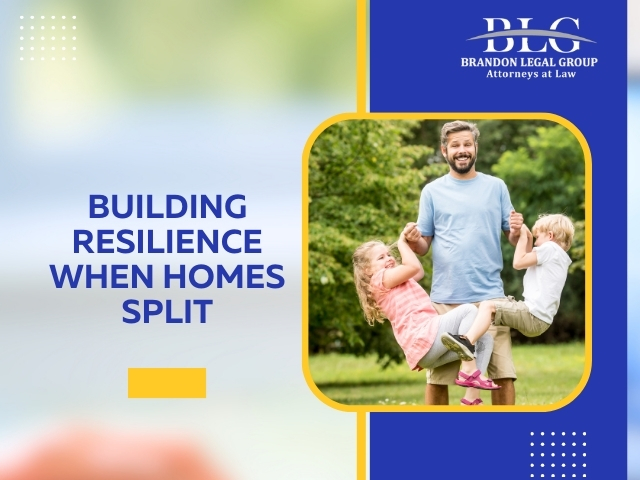Demonstrating Constructive Communication
Openly fighting or criticizing the other parent can inflict deep wounds. Always take the high road by remaining calm, waiting to continue difficult talks privately, and reiterating mutual respect despite challenges.
The following is a DRAMATIZATION AND IS NOT AN ACTUAL EVENT: One father got frustrated with his ex-wife, but tempered his reaction by simply saying: “Let’s continue this conversation another time when we can give it proper attention.”
Tips for Communicating With Your Ex-Spouse
Below is a list of essential tips to facilitate effective communication with your ex-spouse when dealing with custody and co-parenting matters:
– Maintain respect and a child-centered focus.
– Use clear, concise language and regular communication.
– Be flexible, share important info, and use written communication.
– Avoid personal issues, follow court orders, and consider professional help if needed.
– Encourage your child’s relationship with the other parent and keep records.
Upholding Stability Through Consistent Presence
Attend all school events, prioritize scheduled custody days, and minimize unnecessary schedule disruptions. Display reliability so children feel secure despite shifting dynamics.
The following is a DRAMATIZATION AND IS NOT AN ACTUAL EVENT: When work travel threatened to make a mother miss ballet rehearsals, she rearranged her meetings proactively so no performances got missed
Navigating Co-Parenting Challenges
Divorcing spouses often face significant hurdles when it comes to co-parenting. However, it’s crucial to model resilience and wise behaviors for the sake of your children’s well-being. As specialists with over two decades of experience assisting children through these transitions, we offer practical guidance to help you thrive as a positive role model.
Effective Co-Parenting Communication
Constructive communication between co-parents is vital. Public conflicts or criticizing the other parent can deeply affect your children. Taking the high road by remaining calm, postponing difficult discussions for private settings, and emphasizing mutual respect despite challenges can make a significant difference.
The following is a DRAMATIZATION AND IS NOT AN ACTUAL EVENT: One father, frustrated with his ex-wife, tempered his reaction by simply saying: “Let’s continue this conversation another time when we can give it proper attention.
Consistency and Stability
To ensure your children’s well-being, attend all school events, prioritize scheduled custody days, and minimize unnecessary disruptions to their routines. Displaying reliability helps children feel secure despite shifting family dynamics.
The following is a DRAMATIZATION AND IS NOT AN ACTUAL EVENT: When work travel threatened to make a mother miss ballet rehearsals, she proactively rearranged her meetings to ensure no performances were missed.
Seeking Professional Support
While modeling resilience and positive behaviors is essential, seeking professional support can be equally crucial. With over two decades of experience in assisting families during divorce, we understand the importance of insulating children from adult problems and maintaining healthy routines.
Support from Divorce Counselors and Therapists
To children, divorce can be like a puzzle with missing pieces, leaving them feeling confused and uncertain. As parents, it’s essential to recognize how children interpret divorce and take steps to help them adjust smoothly.
One way to safeguard your child’s best interests is to consult divorce counselors or child therapists if you notice any signs of behavioral changes. These professionals can offer guidance and support tailored to your child’s needs, helping them navigate the emotional challenges that often accompany divorce.
Our Comprehensive Support System
Our team of lawyers and counselors is here to help your family during divorce. We assist you in being strong through this process and provide expert advice to help your children cope. Let us be the support that guides your family towards a hopeful future, where you can emerge even stronger and resilient.
FAQs
1. How can I safeguard my child’s best interests?
Insulate children from adult problems, maintain healthy routines, model resilience daily, and consult divorce counselors or child therapists at any signs of behavioral changes.
2. What communication strategies work best?
Schedule regular check-ins, validate children’s feelings, practice active listening, watch your tone and body language, reassure often, and remain the calmest one in conversations.
3. How can I handle disagreements with my ex-spouse regarding parenting decisions?
It’s natural for disagreements to arise. To handle them constructively, try discussing the issue calmly, focusing on the child’s best interests, and considering compromise. If necessary, consult a mediator or seek legal advice.
4. What should I do if my ex-spouse is not following the court-ordered custody arrangement?
If your ex-spouse is not complying with the court-ordered custody arrangement, document the violations and attempt to resolve the issue through communication. If that fails, you may need to seek legal intervention to enforce the court’s orders.
5. Can I modify a custody agreement if circumstances change after the divorce is finalized?
Yes, you can seek modifications to a custody agreement if significant changes in circumstances occur, such as relocation, job changes, or changes in the child’s needs. Consult with your attorney and follow the legal process to request a modification from the court.
We’re Your Family’s Compass Through the Fog
Our lawyers and counselors form a complete support system guiding you towards positive role modeling as a divorcee and offering children specialist-backed coping strategies. Let us shine a beacon cutting through the chaos so your family emerges even stronger.
